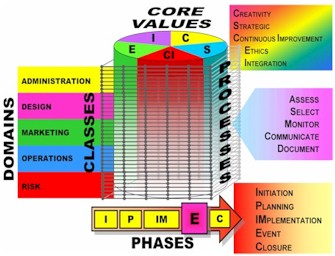EMBOK Day 2007
examined the role of the
International EMBOK Model (see below) in the context of curriculum
development for academic programs.
Using the “open space” format, i.e. the agenda was driven by those in
attendance and their topics of interest, the discussion focused primarily on
using the EMBOK framework as a benchmark/standard for development of
accreditation for events management programs as well as articulation
agreements between institutions to ensure the efficacy and efficiency of
credit transfer.
Numerous types of
educational programs discussed included university degree programs,
community college programs, continuing education programs, certificate
programs offered through universities as well as commercial entities, and
professional certification programs offering credentials through industry
associations. It was noted articulation agreements that allowed the transfer
of credits between universities and with community colleges
often required
the same course title and
course number as well as an assurance that the same scope and level of
content was covered.
It was suggested that the
EMBOK knowledge domains provided the nomenclature for comparable course
titles as well as an assessment tool for course content. In addition, it
offered a benchmark for curriculum differentiation between programs aimed at
credit transfer (e.g. community college) and those aimed at personal
development or interest (e.g. continuing education), with the credit
transfer programs adopting a broader scope and deeper content. Of note, the
participants were exclusively faculty members in the academic realm
(university and community college), and therefore professional development
programming offered through industry associations was not included in the
discussion. However, it was observed that the EMBOK could be used as the
standard for both certificate programs (educational institutions) and
certification programs (professional associations).
Uses
discussed for the EMBOK included:
-
establishing standards
for a quality equivalency assessment of curricula
-
a capstone course
assessment tool; mapping the exit test to the knowledge domains
-
establishing linkage
across numerous degree program curriculums and course materials (e.g.
textbooks)
-
illustrating the
commonalities of skill sets in different event sectors (e.g. meetings v.
trade shows v. sports events) and thereby fostering career mobility
As was also discussed at
the 2006 EMBOK Day, it was cited that many opportunities exist within the
EMBOK Model for academic programs with both an applied and a research
emphasis, and participants were referred to the
EMBOK Research Menu as a tool. The
scarcity of study materials for the EMBOK was noted, and participants were
advised that a PowerPoint describing the Model and its features was
available for downloading on the International EMBOK web site (
www.embok.org)
as an educational resource.
Overall, the participants
agreed that the EMBOK framework will serve as a valuable curriculum
development tool for them and has the potential for elevating the status of
events management programs as well as facilitating quality assurance
initiatives for academic programming, workforce education, and regulatory
agendas.


